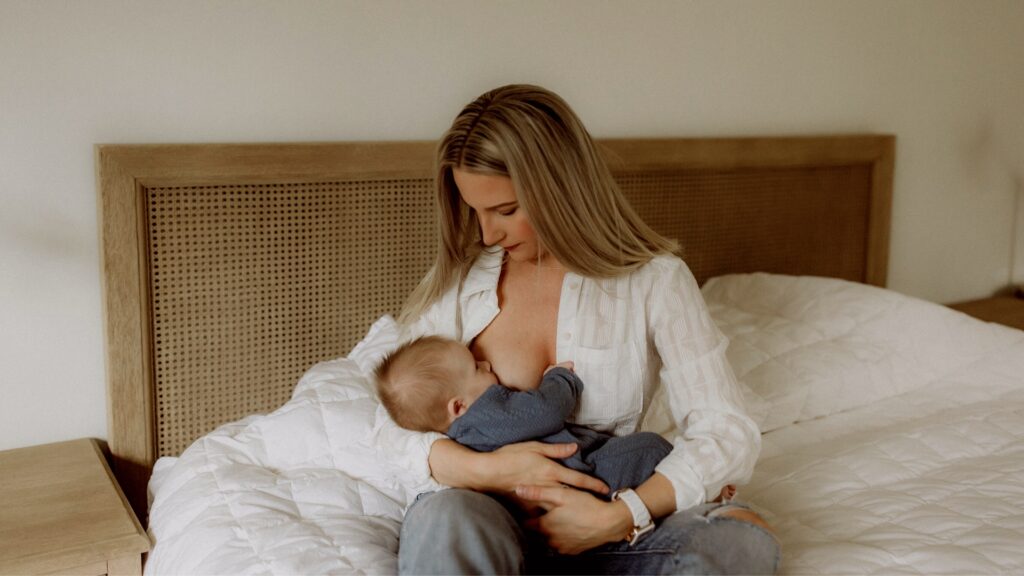They’re the BIG questions every mother is desperate to know… Do breastfed babies sleep through night? Do they sleep through the night before a bottle-fed baby? Will it happen soon? What does sleeping through the night mean for me?
Fortunately, you’re in the right place. With almost 40 years of childcare experience as a Norland Nanny and mother, in today’s article, I will share all of the information you need to know about getting your breastfed baby to sleep through the night.
Ready to reclaim your sleep? Let’s dive right in…

Table of Contents
Can Babies Sleep Through The Night?
Yes, babies can sleep through the night!
However, WHEN babies can sleep through the night varies widely. And your definition of sleeping through the night might vary from other parents.
In my book, sleeping through the night means your baby consistently sleeps for at least 6 hours.
This can be from midnight to 6 am… Or even 10 pm to 4 am.
Having a consistent 6-hour stretch of sleep is also far more achievable than expecting your baby to sleep from 7 pm to 7 am.
Therefore, you are less likely to get frustrated with baby’s progress – a feeling no parent wants.
The good news is that by six months, most infants are developmentally capable of sleeping through the night.
However, factors like teething, growth spurts, illness, hunger, and sleep regressions can trigger nighttime wakings, all of which are perfectly normal.
Looking to get your little one to sleep quickly and effortlessly? Check out my Bedtime and Nap Cheat Sheet and master the art of making daytime naps and bedtimes as seamless as possible.
A bedtime & nap cheat sheet so good your little one will ask you to put them to bed...
Laura Williams "This is a life saver! I'm so glad I downloaded your bedtime & nap cheat sheet. My little one actually asked me to put him to bed last night! Unbelievable! Thank you so much!"
Click Here For The FREE Cheat Sheet
When Do Breastfed Babies Sleep Through The Night
Regardless of whether breast or bottle-fed, newborns need to wake every few hours to feed due to their small stomachs and their need for regular nutrition to sustain the first few weeks of intense growth and development.
However, as your baby grows, they will start to sleep for longer stretches and need feeding less frequently. This is when you will notice the different sleep patterns between breastfed and formula-fed infants due to the digestibility of breast milk.
Breast milk is easier to digest so your baby will wake up more often for feedings during the night.
Most breastfed babies begin to sleep for longer stretches after about 3 months. By this time, your milk supply has established a rhythm, which aids in more consistent sleep patterns.
It’s common for a breastfed baby to start sleeping through the night, meaning 6 hours, at around 6 months old.
TOP TIP: Nursing right before bedtime, cluster feeding, and offering a dream feed can all help your baby settle and sleep for longer stretches.
Should You Feed Baby Every Time They Wake At Night
No, I would not recommend feeding your baby every time they wake. This is because night wakings can occur for reasons other than hunger, such as needing comfort, the inability to self-settle, or because they’re ready to start solid foods.
The exception to this rule is for newborns as they require frequent feedings – around 8 to 12 times daily (every 2-3 hours).
But how do you know if your baby has woken out of hunger or not?
- Well, if your baby is fussing or sucking on their hands then give your baby a feed as these are signs of hunger.
- If they are not, try comforting your baby back to sleep by gently patting their tummy or singing a very soft lullaby.
NOTE: If you feel confident that your older baby has had plenty to eat during the day and in the lead-up to bedtime, they may be waking out of habit. To break this habit offer some water, or a shorter breastfeeding to wean off night feeds.

How To Get A Breastfed Baby To Sleep Through The Night
Getting a breastfed baby to sleep through the night is all about establishing a consistent bedtime routine, a cozy sleep environment, and beginning the night weaning process.
But remember, it is important to avoid comparing your breastfed baby with formula-fed babies, as formula takes longer to digest, leading to different sleep patterns.
Baby Bedtime Routine
For baby’s bedtime routine, begin with a soothing bath, followed by a baby massage, a feed, and a quiet story before bed to ensure your baby is ready for sleep.
NOTE: It’s important to feed your baby fully before bedtime to minimize hunger-based awakenings but try to avoid feeding them to sleep, as this will make it more likely that they will want to be fed for comfort when they wake. So give baby a feed after their massage but before a lullaby or bedtime story.
Cozy Sleep Environment
You should also aim to give your baby the best chance to sleep through the night by creating a comfortable sleep space conducive to sleep:
- Ensure the room is dark or dimly lit by a nightlight.
- The room should also be quiet and free from distractions. A white noise machine can help stop ambient sounds from disturbing your sleeping baby.
- Make sure the room is at the correct temperature – between 68 to 72 degrees Fahrenheit (20 to 22 degrees Celsius) – consider using a room thermometer to keep track of baby’s room temperature and to help you dress them appropriately for the time of year.
- Check baby’s diaper right before bedtime to decrease the chances of discomfort waking them up.
Night Weaning
Night weaning can gradually help a breastfed baby to sleep longer stretches too. However, introduce this process only when your baby is developmentally ready (as they near their 1st birthday), as breastfed babies need to ingest more milk than formula-fed babies.
If you are unsure whether nighttime weaning is right for your baby, I always recommend speaking to a healthcare provider to decide when and how to begin night weaning.
Keep reading to learn more about night weaning to help with nighttime wakings.
Other Notes
For many babies, introducing solid foods at around 6 months of age can help them sleep through the night as the extra calories and fiber help keep their tummies fuller for longer.
You must also be aware that sleep training your baby to get them sleeping through the night is a personal choice and many methods exist.
If you choose to implement sleep training, be informed about gentle approaches that align with breastfeeding. Read this post to learn more: 7 Fail-Proof Sleep Training Methods Every Parent MUST Know
How Can I Gently Night Wean A Breastfed Baby
Night weaning your breastfed baby needs to be a gradual process to help your baby sleep for longer periods at night and to prevent you from experiencing engorgement.
Before starting, consult with your pediatrician to ensure your baby is ready for gentle night weaning and to put your mind at rest that you are getting the timing right.
To sleep through the night your baby will need adequate nutrition during the day and have started on solid foods. This usually happens at around 6 months of age. However, you can help your baby to sleep for longer periods leading up to this significant milestone.
So how do you help your little one learn to sleep through the night without a feed?
- Offer more frequent feedings or longer nursing times during the day. This can satisfy your baby’s hunger and reduce the need for nighttime feeding. A full baby during the day is less likely to wake up hungry.
- Offer a dream feed to younger babies before you go to bed to help your baby sleep for longer periods at night. Learn more about dream feeding here: How To Dream Feed: A Complete Guide
- Create a recognizable and soothing sleep routine to signal bedtime is coming. Incorporate calming activities such as reading or soft music to help your baby associate these cues with sleep rather than nursing.
- Gradually reducing the amount of time you feed baby over several nights. You might consider introducing a pacifier to replace the comfort of sucking too.
- If you suspect your baby is not hungry, try and comfort them in other ways, such as patting their tummy or shushing. Be patient as your baby learns to fall asleep without nursing.
- Ensure your baby is getting enough daytime sleep to prevent overtiredness. An overtired baby might have a harder time settling at night or staying asleep as their body is full of adrenaline and cortisol (stress hormones).
- If you have been co-sleeping I suggest that you move your baby to their own sleep space BEFORE starting to night wean as it will be more difficult for you both if you are sleeping in the same bed.
- Monitor your milk supply during this process. Maintaining frequent daytime feedings ensures you continue to produce enough breast milk and gradually reducing night fees allows your body to adjust to the new feeding schedule.
- Keep nighttime interactions low-key and quick. Use a night light so that you do not have to turn on bright lights to feed or re-settle.
- Try not to feed baby to sleep. You want to break the feed-sleep association. If baby begins to drift off, tickle their feet or undo a few buttons to let a breeze keep them alert.
- For older babies, try offering some water in a bottle when they wake up instead of breastfeeding.
REMEMBER: Being consistent and patient in your approach is key to establishing new sleep habits and it is important to appreciate that getting your baby to sleep through the night is a slow process for many and most babies will need some gentle help.

How To Stop A Breastfed Baby Waking At Night
I think it is important to point out that it is perfectly normal for babies to wake up at night. Having a baby that never wakes at any point is rarely going to happen.
However, having a little one that sleeps 6 hours most nights and only wakes occasionally is every parent’s dream.
When your baby is very young, giving them a dream feed and having them sleep for 5-6 hours at night will be your first breakthrough. Progressively the length of time they sleep at night will extend until you reach the holy grail of your baby sleeping from bedtime to morning, without waking and without you having to dream feed.
Knowing what to expect sleep-wise at any age can ensure that you adjust your expectations and appreciate the progress that you are making with helping your breastfed baby sleep through the night.
Newborns
When your baby is first born they will not sleep through the night. They have small stomachs that require feeding frequently (every 2-3 hours) to support the rapid growth and weight gain, that needs to take place in the early weeks.
- Newborn Sleep Schedule
- 1-Month-Old Sleep Schedule
- 2-Month-Old Sleep Schedule
- 3-Month-Old Sleep Schedule
4 to 5 Months
By 4-5 months many babies will occasionally sleep for longer at night and may even drop a feed. However, it is common for many babies at this age to still wake for 2-3 nighttime feeds for them to sleep 10-12 hours during the night.
NOTE: At this age, your baby can safely sleep through the night without feeding, so you do not need to feel anxious if your baby starts to sleep for longer periods at night. Instead, enjoy the extra sleep whenever you can.
6 Months
6 months is the age at which most babies are ready and able to sleep through the night in the true sense of the word. Your baby will have dropped at least 1 or 2 feeds at night and will be preparing to drop the final one.
With the introduction of solid foods and the knowledge that night feeding is not required nutritionally, you can go ahead and drop the final night feeds with confidence, by using gentle night weaning and sleep training in conjunction.
9 to 12 Months
By 9 to 12 months of age, I would not expect babies to be waking for a feed at night because of hunger. Instead, they are probably waking out of habit and for comfort due to separation anxiety.
I find that a combination of gentle night weaning and sleep training can help your baby become a consistently good sleeper.
Always be responsive to your baby’s cries, but give them a few minutes to see if they can fall back asleep on their own.
If crying persists, address their needs promptly. If you are sure they are not hungry, try to re-settle your baby without resorting to a feed first.
If you do feed baby make the feed short or offer water instead. Gradually baby will learn to self-settle and not rely on a feed for comfort.
Frequently Asked Questions About Babies Waking At Night
In this section, you’ll find answers to common concerns about breastfed babies and their sleep patterns at night.
Q: Is it normal for breastfed babies to wake up at night?
A: Yes, it’s normal for breastfed babies to wake up during the night. Their smaller stomachs digest breast milk quickly, which often means they need to feed several times throughout the night to stay satisfied. As your baby grows, the frequency of nighttime awakenings will decrease.
Q: Will my milk supply decrease if my baby starts sleeping through the night?
A: Your body will adjust to your baby’s feeding needs so when your baby starts sleeping through the night, your milk supply will likely adapt to a new feeding schedule. It’s important to maintain regular daytime feedings to ensure your supply matches your baby’s needs. Consult with a lactation expert if you have concerns.
- UK Lactation Consultants of Great Britain
- United States Lactation Consultant Association
- Lactation Consultants of Australia & New Zealand
Q: Why are breastfed babies often reported to wake up more frequently at night?
A: Breastfed babies often wake up more often due to the digestibility of breast milk. Breast milk is easier to digest than formula, leading to a faster return of hunger.
Q: Are there differences in nighttime waking between breastfed and formula-fed babies?
A: The only difference between the night wakings of a breastfed and formula-fed baby is the frequency. Formula is digested more slowly, which might result in fewer nighttime feedings. On the other hand, breastfed babies may wake up more frequently due to quicker digestion and the comforting aspect of breastfeeding. However, every baby is unique, and sleep patterns can vary widely.
Q: Will my baby sleep through the night if I stop breastfeeding?
A: Stopping breastfeeding doesn’t guarantee your baby will sleep through the night. Sleep patterns are influenced by many factors, including developmental stages and individual temperaments so while some parents might see a change in sleep patterns after weaning, there’s no one-size-fits-all answer.
Need More Parenting Help?
- Download our FREE Bedtime & Nap Sleep Cheat Sheet. It’s a free, easy-to-use and proven formula designed for parents of 0-5 year olds to master the art of consistently undisturbed and restful sleep without the yelling, nagging or exhausting long-winded evenings.
- Check out our Parenting Toolbox. You’ll get access to expertly-chosen products that you can guarantee are the best for your little one and your wallet.
- Are you looking for personalized guidance to navigate the challenges of parenting? I offer 1-on-1 consultations to bring you tailored strategies and actionable advice to help support your child's growth and well-being with confidence.

A bedtime & nap cheat sheet so good your little one will ask you to put them to bed...
Laura Williams "This is a life saver! I'm so glad I downloaded your bedtime & nap cheat sheet. My little one actually asked me to put him to bed last night! Unbelievable! Thank you so much!"
Click Here For The FREE Cheat Sheet


